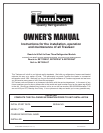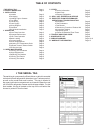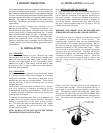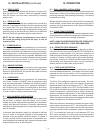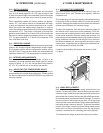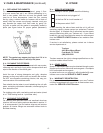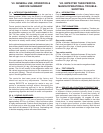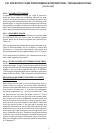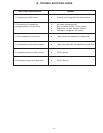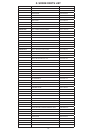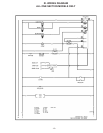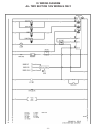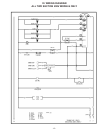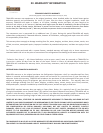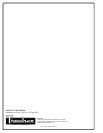
VII. a - INTRODUCTION/OVERVIEW:
The Traulsen Even Thaw is designed to be used as a
thawing cabinet. While it may be utilized in a refrigeration
mode, that is not its intended use. Its function is to hold the
cabinet temperature in the range from 38 to 40 degrees
to thaw product within the food-safe temperature zone.
Frozen product placed into the unit will pull the cabinet
temperature below the heater set point (37 deg.)and the
unit will begin to function in the thaw mode. This prompts
the refrigeration system to turn OFF, and the heaters to turn
ON. The fans remain ON, circulating this cold air around
the product, allowing for rapid thawing. When cabinet air
temperature reaches the upper set point (38 deg. although
the product is actually much colder), the heaters turn OFF.
As the cabinet temperature reaches the heater set point, the
heat will be cycled off while the internally generated heat from
the circulation fans continues to add heat to the cabinet. If
sufcient cold capacity or possibly other frozen product is
added to the unit and subsequently lowers the cabinet tem-
perature more than 1 degree below the heater set point, the
heat will again turn on to thaw the product.
If the cold capacity of the product no longer sufciently pulls
down the cabinet temperature below the heater set point, the
cabinet temperature will slowly rise to attain the evaporator
coil cut-in set point (41 deg.) and energize the refrigeration
system. The unit will remain in the refrigeration mode until
the cabinet temperature pulls down to the compressor cut-
out set point (38 deg.). The unit will continue to operate and
cycle in the refrigeration mode.
The controller has been preset at the factory and
should not require any adjustments. Traulsen engi-
neering EXPECTS no changes be made to any set-
points or parameter settings without discussing the
situation and obtaining approval to do so. Modifying
the default set points could disrupt the operation/functional
programming algorithm and result in erratic unit operation.
VII. b - LOADING GUIDELINES:
The Even-Thaw model can accommodate any size partial
load, or up to (28) 18” x 26” pans of product (for example
approximately 672 lbs. of chicken). Use of aluminum pans
is highly recommended. Product should be placed on pans
in one layer only to allow for proper airow. With a full load
thaw time will be between 22 & 24 hours. Overloading and/
or double wrapping product will extend thaw times.
VIII. a - INTRODUCTION:
Even thaw performance is a function of many factors, espe-
cially those involving product types and loading. As a result,
actual thaw times will vary as even similar sized loads of the
same product will exhibit some differences in their thawing
characteristics.
VIII. b - TEST PARAMETERS:
To provide a general performance baseline, Traulsen per-
formed some controlled testing in our lab which may provide
the operator with an approximate idea on what to expect from
their Even-Thaw unit. Full load batches of frozen product
were used as follows:
One section models
336 lbs. of chicken, distributed between 14 tray levels.
Each level consisted of 24 lbs. of product loaded into
two pans (four 6 lb. pkgs. of frozen product total per
level/two 6 lb. pkgs. per tray).
Two section models
672 lbs. of chicken, distributed between 28 tray levels.
Each level consisted of 24 lbs. of product loaded into
two pans (four 6 lb. pkgs. of frozen product total per
level/two 6 lb. pkgs. per tray).
1008 lbs. of chicken, for two section megathaw loads.
VIII. c - TEST RESULTS:
Under these actual load parameters, the one-section
model generally required approximately 15-19 hours
in order to completely thaw the entire load.
The two section model requires approximately 18-22 or
megathaw models 22-24 hours to completely thaw the entire
load.
VIII. d - RESULTS AS A FUNCTION OF PRODUCT MIX:
The above thaw times were based upon a mixed load
of different chicken products typically found in many
establishments. It is important to note that initially, all
tests performed were based on a mixed load of product.
This consisted of approximately 1/4 nuggets,1/4 strips,
1/4 to 1/3 breasts. This MIXED batch thawed in the times
listed above. In actual operation, thaw batches consist-
ing of a single type of product, or other ratios of different
products may require more time for thawing. Both this and
larger size loads can both contribute to longer thaw times.
-6-
VII. GENERAL USE, OPERATION &
SERVICE SUMMARY
VIII. EXPECTED THAW PERFOR-
MANCE/OPERATIONAL TROUBLE-
SHOOTING



